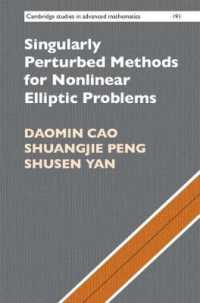- ホーム
- > 洋書
- > 英文書
- > Politics / International Relations
基本説明
Includes in-depth comparisons from Brazil, Mexico, France and Israel.
Full Description
This book provides a framework for analyzing the impact of the separation of powers on party politics. Conventional political science wisdom assumes that democracy is impossible without political parties, because parties fulfil all the key functions of democratic governance. They nominate candidates, coordinate campaigns, aggregate interests, formulate and implement policy, and manage government power. When scholars first asserted the essential connection between parties and democracy, most of the world's democracies were parliamentary. Yet by the dawn of the twenty-first century, most democracies had directly elected presidents. David J. Samuels and Matthew S. Shugart provide a theoretical framework for analyzing variation in the relationships among presidents, parties, and prime ministers across the world's democracies, revealing the important ways that the separation of powers alters party organization and behavior - thereby changing the nature of democratic representation and accountability.
Contents
1. Introduction; 2. Political parties in the Neo-Madisonian theoretical framework; 3. Insiders and outsiders: Madison's dilemma and leadership selection; 4. Constitutional design and intra-party leadership accountability; 5. Electoral separation of purpose within political parties; 6. The impact of constitutional change on party organization and behavior; 7. Parties' 'presidential dilemmas' in Brazil and Mexico; 8. Presidents, prime ministers, and mandate representation; 9. Conclusion.







